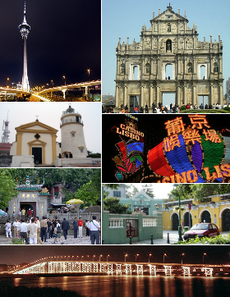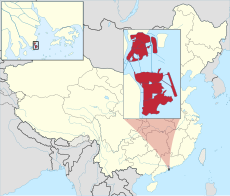Macau
The Macao Special Administrative Region (Macau or Macao, simplified Chinese: 澳门; traditional Chinese: 澳門; pinyin: Aomen; Jyutping: Ou Mun) is one of China's two Special Administrative Regions. (The other one is Hong Kong). Macau is a small city in the southern coast in China. Like Hong Kong, Macau also has a large amount of autonomy, with its own passport, currency, economic rules, and constitution.
| |
|---|---|
Anthem:
| |
 Clockwise from top right: Ruins of St. Paul's; Casino Lisboa; St Joseph Seminary Church; Governor Nobre de Carvalho Bridge; A-Ma Temple; Guia Fortress; Macau Tower. | |
 | |
| Official languages |
|
| Ethnic groups |
|
| Demonym(s) | Macanese |
| Government | Special administrative region |
| Ho Iat Seng | |
| Cheong Weng Chon | |
| Sam Hou Fai | |
| Kou Hoi In | |
| Legislature | Legislative Assembly |
| Establishment | |
• Portuguese administration | 1557 |
• Portuguese colony | 1 December 1887 |
| 20 December 1999 | |
| Area | |
• Total | 29.5 km2 (11.4 sq mi) (235th) |
• Water (%) | 0 |
| Population | |
• 2012a estimate | 568,700[3] (167th) |
• 2011 census | 552,503[4] (167th) |
• Density | 18,568/km2 (48,090.9/sq mi) (1st) |
| GDP (PPP) | 2011 estimate |
• Total | US$47.19 billion (98th) |
• Per capita | US$82,400 (4th) |
| GDP (nominal) | 2012 [5] estimate |
• Total | US$44.300 billion (98th) |
• Per capita | US$77,353 (4th) |
| HDI (2007) | very high · 25th |
| Currency | Macanese pataca (MOP) |
| Time zone | UTC+8 (MST) |
• Summer (DST) | not observed |
| Driving side | left |
| Calling code | +853 |
| ISO 3166 code | MO |
| Internet TLD | .mo |
| |
| Macau | |||||||||||||||||||||||||||||||||
 | |||||||||||||||||||||||||||||||||
| Chinese name | |||||||||||||||||||||||||||||||||
|---|---|---|---|---|---|---|---|---|---|---|---|---|---|---|---|---|---|---|---|---|---|---|---|---|---|---|---|---|---|---|---|---|---|
| Traditional Chinese | 澳門 | ||||||||||||||||||||||||||||||||
| Simplified Chinese | 澳门 | ||||||||||||||||||||||||||||||||
| Jyutping | ou3mun4*2 | ||||||||||||||||||||||||||||||||
| Cantonese Yale | Oumùhn | ||||||||||||||||||||||||||||||||
| Hanyu Pinyin | Àomén | ||||||||||||||||||||||||||||||||
| Literal meaning | Bay gate | ||||||||||||||||||||||||||||||||
| |||||||||||||||||||||||||||||||||
| Macao Special Administrative Region | |||||||||||||||||||||||||||||||||
| Traditional Chinese | 澳門特別行政區 (or 澳門特區) | ||||||||||||||||||||||||||||||||
| Simplified Chinese | 澳门特别行政区 (or 澳门特区) | ||||||||||||||||||||||||||||||||
| Jyutping | Ou3mun4*2 Dak6bit6 Hang4zing3 Keoi1 | ||||||||||||||||||||||||||||||||
| Hanyu Pinyin | Àomén Tèbié Xíngzhèngqū (Àomén Tèqū) | ||||||||||||||||||||||||||||||||
| |||||||||||||||||||||||||||||||||
| Portuguese name | |||||||||||||||||||||||||||||||||
| Portuguese | Região Administrativa Especial de Macau for "Macau Special Administrative Region" | ||||||||||||||||||||||||||||||||
It consists of Macau Peninsula (Aomen Bandao), Taipa Island (Dangzai Dao), Coloane Island (Luhuan Dao) and Cotai (Ludangcheng), the new reclaimed land between Taipa and Coloane. It is very densely populated, with over half a million people living in just over 12 square miles.
Macau used to be a colony of Portugal. Although Portuguese is an official language alongside Chinese (as a result of it being a Portuguese colony in the past), very few Macanese actually speak Portuguese; only about 0.7% speak it at home. As a matter of fact, English is more commonly spoken, despite it not being an official language (about 2.3% speak it at home). Cantonese is the main dialect of Chinese spoken in Macau. However, Mandarin has also become more common since Portugal returned it to China in 1999.[7]
Today, Macau mostly makes money from offshore gambling. In fact, Macau generated 7 times greater gambling revenue than Las Vegas in 2013.[8] People in Macau also make some money from exporting clothing.
As Macau was previously a Portuguese colony, you can easily find traces of how the Portuguese culture is presented in the city. One of them is itinerary for couples, who are intending to spend a day exploring Macau.[9]
Economy of Macau
changeMacau’s economy relies on gambling. Eighty percent of the government’s revenue is derived from gambling. The revenue generated by gambling in 2019 was $36.5 billion, which is about 6 times larger than Las Vegas. Macau has 41 casinos including several that belong to Wynn resorts and Sands.
Macau is the only part of China where gambling is legal. Many of the customers of casinos are wealthy Chinese.
Around 2020 Chinese new year authorities closed down travel from China to Macau. Visits fell eighty percent. It is estimated by some observers that the 2019–20 coronavirus outbreak will cost Macau between 5-15 percent of its gambling revenue. [10]
References
change- ↑ As reflected in the Chinese text of the Macau emblem, the text of the Macao Basic Law Archived 2012-02-05 at the Wayback Machine, and the Macao Government Website Archived 2012-06-29 at the Wayback Machine, the full name of the territory is the Macao Special Administrative Region of the People's Republic of China. Although the convention of "Macao Special Administrative Region", "Macao" and "Macau" can also be used.
- ↑ The Macau Basic Law states that the official languages are "Chinese and Portuguese." It does not explicitly specify the standard for "Chinese". While Mandarin and Simplified Chinese characters are used as the spoken and written standards in mainland China, Cantonese and Traditional Chinese characters are the long-established de facto standards in Macau.
- ↑ "Demographic Statistics for the 2nd Quarter 2012". Statistics and Census Service. Macao SAR Government. Retrieved 10 August 2012.
- ↑ "Results of 2011 Population Census". Statistics and Census Service. Macao SAR Government. Retrieved 14 August 2012.
- ↑ "CIA World Factbook". Archived from the original on 2018-12-25. Retrieved 2013-07-12.
- ↑ "Macao in Figures 2010". Statistics and Census Service, Macau SAR. 2010. Retrieved 1 July 2010.
- ↑ "What language is spoken in Macau?".
- ↑ Riley, Charles (6 January 2014). "Macau's gambling industry dwarfs Vegas". CNN.
- ↑ "Couple Itinerary for Macau Day Trip from Hong Kong". Easy Travel Recipes. 8 June 2020. Retrieved 2021-01-04.
- ↑ "Coronavirus shuts Macao, the world's gambling capital". 4 February 2020.

